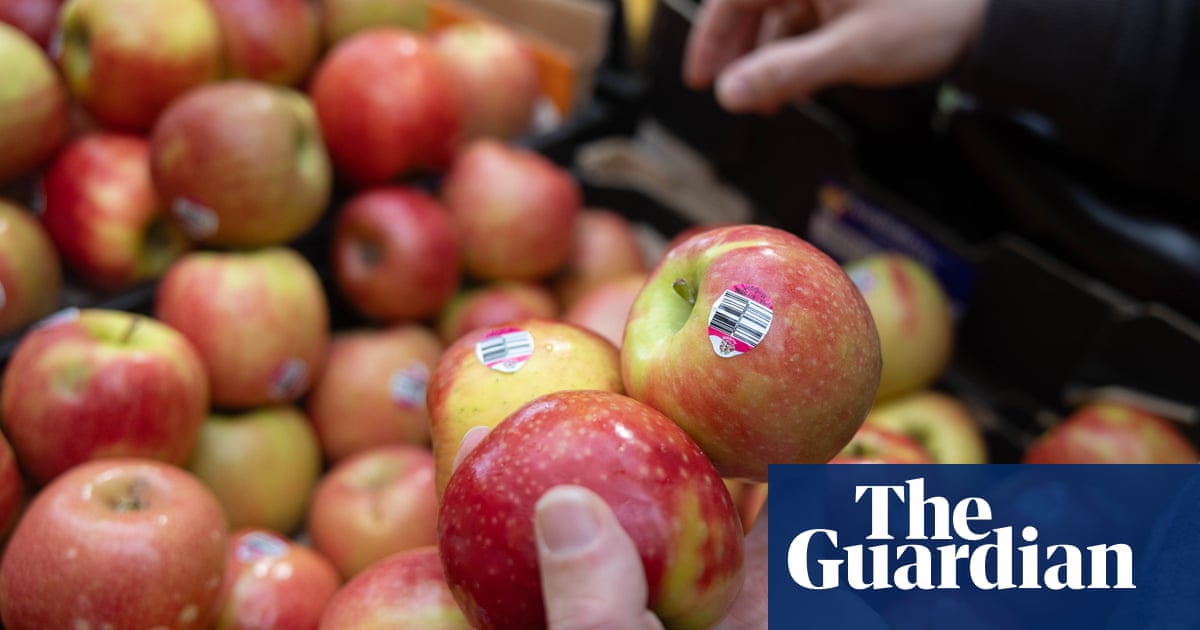Fruit stickers may be small, but they can bemighty annoying.
Each year 5.62bn plastic labels are picked off fruit and vegetables in Australia,data shows. Those that are not accidentally eaten, washed down the sink orburied in compost, usually end up in landfill, adding about 110 tonnes of plastic to the pile.
South Australia was set to ban the stickers from September, along with other problematic plastics like soy sauce fish, and it would have been the first Australian jurisdiction to do so.
Sign up to get climate and environment editor Adam Morton’s Clear Air column as a free newsletter
Residents overwhelminglysupported the proposed ban. “These are so bloody annoying and unnecessary,” one wrote in a submission. “I hate these stickers and consider them totally unnecessary on my fruit products,” said another.
But the stickers will be sticking around a little longer.
This week SA shelved its September deadline, after growers and industry bodies asked for more time. Meanwhile, across the Tasman Sea, New Zealand’s ban, instituted in 2023, has beenput on hold.
Are fruit sticker bans coming unstuck?
The plastic labels become a problem when they end up in home compost or in the curbside organics bin, says Ryan Collins, the head of research at Planet Ark.
“If they’re left on those scraps, on the skin, and they go into curbside collection, then it ends up being a contaminant for the organics processor or composter,” he says. That becomes a cost and quality issue for organic waste companies, whose products are used in agriculture and urban landscaping.
They could also become litter, Collins says.
Cip Hamilton, the plastics campaign manager at the Australian Marine Conservation Society, says the stickers often end up in compost bins and eventually contaminate the soil. “Once in the environment, plastics are almost impossible to recover. Plastic fragments can cause devastating impacts to our wildlife and ecosystems.”
The plastic labels, glued to the skin of apples, bananas, pears and more, are for convenience: there is nothing in Australia’s Food Standards Code that requires retailers to label fresh fruits and vegetables.
Most include a PLU: the acronym for price look-up code, four or five digits used to identify the variety of fruit and how it was grown – part of a voluntary global system for categorising fresh produce. Some featureeye-catching designs.
The stickers are the best option for providing information to consumers and retailers (about origin, variety and price) with the least amount of packaging, the Australian Fresh Produce Alliance saidin a submissionlast year.
“Additionally, they play a vital role in inventory management, traceability, reducing food waste and quality control for both producers and retailers.”
Sign up toClear Air Australia
Adam Morton brings you incisive analysis about the politics and impact of the climate crisis
after newsletter promotion
There were non-plastic alternatives – like compostable stickers – the industry group said, but they were not yet available at commercial scale.
Fruit tattoos – labels lasered on to skin or peel – have also emerged as an option, trialled by producers and supermarketsacross Europeandthe UK.
Several Australian jurisdictions have flagged fruit stickers for the chopping block, as they look to get rid of single-use plastics. And governments have agreedthey are a priority, where better coordination is needed.
The South Australian environment minister, Dr Susan Close, said the state remained committed to the reform. “Many South Australians told us through previous surveys and consultations that they ‘loathed’ fruit stickers as an inconvenience to remove before they recycle their food scraps.”
It was a short delay – rather than a stop – Close said, and over the next 12 months the government would be working with growers, industry bodies and other jurisdictions.
New South Waleshas proposedto require compostable labels by the end of 2030. In Tasmania, fruit stickers have been slated for the second stage of the state’ssingle-use plastic phase-out.
New Zealand, which has delayed its bar on non-compostable labels to 2028 toalign with the EU, was “not stepping back from its leadership role in tackling plastic waste”, the environment minister, Penny Simmonds, said.
“We are taking a more measured approach to ensure that alternatives are available, that industry has time to adapt, and that any changes are well-considered and manageable so that cost-of-living impacts are limited for businesses and households.”
